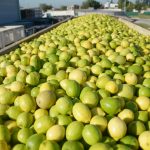Argentine lemon opening a "lump of coal" for California citrus growers

A decision yesterday to open up access to the U.S. market for lemons from Northwest Argentina has been described as a "callous disregard" for California's farmers, but importers are positive about the new deal that will allow for year-round supply.
California Citrus Mutual (CCM) distributed a press release about the development with the headline "USDA Delivers Lump of Coal to California Lemon Growers for Christmas".
The group said the USDA (United States Department of Agriculture) and the Obama Administration's proposal to allow the fruit was "blatantly ignoring" comments from scientists and technical advisors at the National Plant Board, the California Department of Food & Agriculture and members of the state's citrus industry.
It highlighted the Administration acknowledged that "lemon producers, packinghouses, wholesalers and related establishments will be adversely affected economically". 
"As a lemon producer this callous disregard for our family farmer based industry is shocking inasmuch 'our welfare losses' as described in the rule just don't count," said U.S. Citrus Science Council chair Richard Pidduck.
"We asked former USDA scientists, the state entomologist, economic experts from University of Arizona and formerly with USDA to evaluate the proposal all of whom expressed concern with the proposal as written this past summer."
Pidduck said bringing product to the U.S. from pest and/or disease infected areas created vulnerability for the country's largest fresh citrus-growing state.
"Today my production costs are increasing as I battle a number of introduced pests in order to provide a quality product for American consumers," he said.
"As my costs go up I become less competitive in a fresh market as less expensive off shore product steal [sic] shelf space."
In December two reports were issued by USDA, one noting that the numbers of family farmers were shrinking in America while the second cited a continued reduction in farm income.
"Revenues for the 14/15 citrus crop year versus 13/14 were down $600 million," said CCM president Joel Nelsen.
"This Administration and this Secretary fail to connect the dots.
"Former President Eisenhower once stated that farming is easy when you are one thousand miles from the field and your plow is a pencil. I guess the White House believes more in what foreign producers, importers and governments say than domestic providers of food security and scientists that participate in that process."
Importer perspective
J&K Fresh East vice president John Ercolani defended the USDA's practices, emphasizing "extensive research" had been done on the topic.
"In my opinion through that extensive research they’re really limiting the pest risk from Northwest Argentina," Ercolani told www.freshfruitportal.com.
"As far as the benefit that I see, adding Argentina to the mix will allow fresh lemons to be available to U.S. consumers year-round, and really overall drive up lemon consumption in the United States.
"So in our opinion this is a fantastic job well done by the USDA and very beneficial for the U.S. consumer."
Capespan North America CEO Mark Greenberg said he was confident there wouldn't be a negative impact on Californian growers once the fruit arrives.
"I understand that the California producers feel that they take tremendous precautions to prevent any kind of pest or unwanted diseases in their orchards, and I assume many of them have taken exception to introducing fruit from Argentina, with the fear that it would bring in something that otherwise wouldn’t appear in California and isn’t endemic to California," he told www.freshfruitportal.com.
"But I think at the time this fruit comes in, there should not be a negative impact on the California growers, and we have confidence in the USDA APHIS’ ability to monitor and regulate this, and to keep the California crop safe and secure.
He said there was still more work to be done in the orchards to put the systems approach in place and get orchards approved for the U.S. market.
"I expect that the industry in Argentina, who have been looking forward to this for some time, have already taken a lot of preliminary steps to gear up for the next season," he said.
"I don’t know what their timing is, but we would probably see their first fruit arrive in North America sometime in the early summer of 2017. So I guess that’s what they would be shooting for. And I imagine there’s a lot of excitement in Argentina today."
With a greater availability of lemons in the market through increased volumes, he said "one of course would expect prices to decline".
"On the other hand, other competing lemons in the market may go and find other markets for their products if they feel the prices have come down too low."
Argentine industry view
Argentine Citrus Federation (Federcitrus) president José Carbonell said the news was "expected but very good", opening up access to all continental states in the U.S.
He said the campaign for U.S.-export would likely start in April.
"The objective is to be very prudent with the shipments, not to generate any friction with Californian growers or the remaining exporters that exist in the market. I think there is a growing demand for lemons in the world and there is space for everyone," he said.
"Exports will be very limited. We will be extremely cautious with quality and with exporting within concrete windows. We also can't stop attending to our other markets; our main customer is the European Union and obviously we will attend to it."
Photo: www.shutterstock.com















































